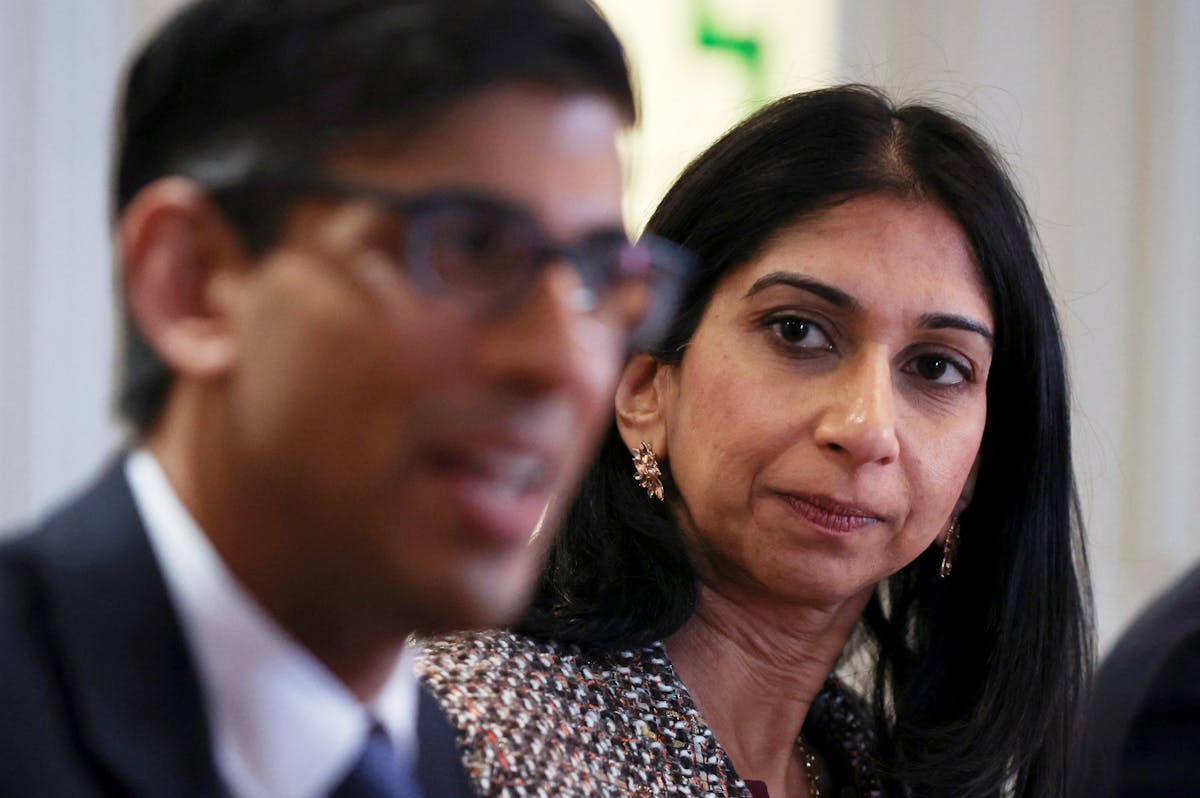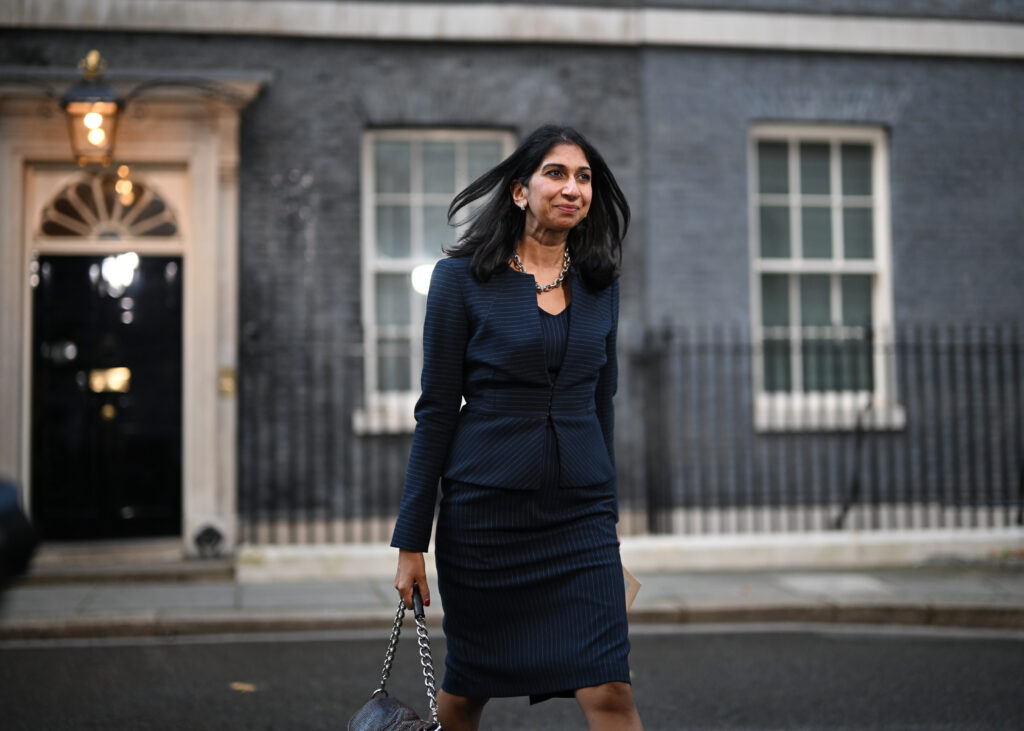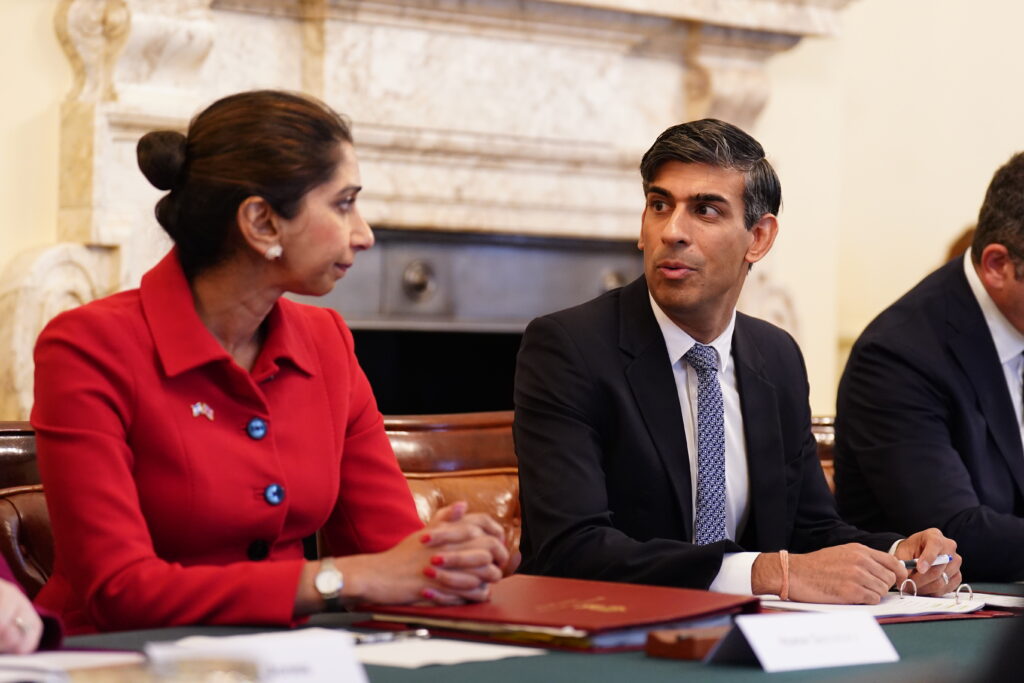Suella Braverman, in a Tory Party Likely To Lose the Next Election, Looks Perfect for Leader of the Opposition
She embodies the faction frustrated with post-Brexit stagnation and with the failure of the government she just quit to, among other things, control the national borders.

Resignations are a polite staple of British politics. In the wake of an election, the Prime Minister will move the deck chairs, hire new people to sit in them, and toss out those who once occupied them, who invariably write lovely letters thanking the same Prime Minister who just sacked them for their time in Downing Street.
It’s all rather inauthentic. Upon being fired, one isn’t beset by feelings of gratitude. It’s a polite norm, and the British political system is built upon polite norms. And, like so many institutions and traditions in our modern political era, this norm is breaking.
Just this August, Deputy Prime Minister Dominic Raab was forced to resign after a specious Justice Ministry report concerning bullying complaints, and his letter made no effort to hide his derision.
The “bullying” in question was that he complained about officials lacking basic information necessary for their jobs, and the “obstructiveness” of government employees who were doing “utterly useless”and “woeful” work. How scandalous.
Mr. Raab, though, still respected the norms of the office, and bore little ill will to Prime Minister Sunak. So he resigned, as the norms demanded. This show of respect did not play out during this week’s firing of Mr. Sunak’s former Home Secretary — and eternal political firecracker — Suella Braverman, whose extraordinary resignation letter Tuesday accused Mr. Sunak of “a betrayal of your promise to the nation.”
Mrs. Braverman, with her acid missive, shattered the norm. Given her lack of love for the Prime Minister, and his expected loss in next year’s election, she had little incentive to sustain it. It was just a matter of time before Mrs. Braverman either stormed out of Downing Street or was pushed out.

The final straw was her unsanctioned November 8 column in the Times of London, in which she accused the police — of whom she was in charge — of biased handling of pro-Palestinian protests, which she had previously referred to as “hate marches.”
Mrs. Braverman embodies the faction of the Conservative voter base increasingly frustrated with post-Brexit stagnation, and frustration that the country’s new potential for global economic impact and national border control has yet to be met. Their criticism has long been that Conservative governments are too concerned about being scolded in the left-leaning Guardian newspaper to actually carry out the right-wing policies they were elected to execute.
Therefore, “small boat” immigration continues to increase, taxes are never slashed, companies continue to leave, antitrust malarky continues to make Britain hostile to new businesses, and the economic opportunity of Brexit is never seized upon. Britain is not the Singapore of Northern Europe, but the shriveled remnant of a former Empire.
Mrs. Braverman’s appointment (she had already been Home Secretary once before, and was fired by Mr. Sunak’s fleeting predecessor, Liz Truss) had been intended to appease this base, and to work to address their core concerns about crime and immigration; and though this started well, the relationship between Mrs. Braverman and Mr. Sunak soon soured.
To caricature their dispute; Mrs. Braverman saw Mr. Sunak as ineffectual, indecisive, and swayed by the establishment that was afraid to make the necessary hard choices. She would try to push an aggressive agenda forward, and face the wrath of the press for doing so, only for the government to let her policies die in court or on the proverbial drawing board, and the issue remained live.

In March 2023, Mr. Sunak stated that migration remained far too high, after figures for 2022 revealed UK net migration was a record 606,000. Approximately 114,000 of these migrants came from Ukraine, and a further 52,000 came from Hong Kong, but the year ended with 172,758 migrants awaiting asylum decisions, and the policy of often housing such migrants in hotels strikes many Britons as unjust, as they financially struggle without comparable support.
As Mrs. Braverman noted in her letter, it was a commitment to address this immigration issue — along with crime in Britain — that led her to cosign Mr. Sunak’s successful leadership bid during last year’s Conservative Party conference. His failure to honor her commitment to this was the “betrayal” that she refers to in her letter; which she offered “Despite you having been rejected by a majority of party members during the summer leadership contest and thus having no personal mandate to be Prime Minister.”
This quote epitomizes the difference between Mrs. Braverman and Mr. Sunak. Her line rings true to populist spirit and has an emotional punch, but ignores that this is the way the system works, and has always worked. Mr. Sunak has just as strong a mandate as his predecessor John Major did in 1990 — right before his government won the most votes of any party in a general election in British history.
Allies of the Prime Minister see Mrs. Braverman as a stubborn ideologue, committed to pushing policies regardless of how indigestible they may be for the broader public or how unlikely they are to pass legal review, and when they invariably failed or were killed, she would blame the Prime Minister.
This internal friction would have been enough to spark discord, but in the press, Mrs. Braverman tried to make herself the heir to the leading face of the anti-immigration, right-flank of the Conservative Party, Nigel Farage, and therefore Mr. Sunak’s chief challenger at the next Conservative leadership conference.
To this end, she often earned more attention in the papers than any other politician, including the Prime Minister under whom she was serving. However authentically said, this seems to have been the underlying motivation for her fiery letter: publicity for a future leadership bid.

To a degree it worked — I am writing this piece, after all — but she delayed the release of her letter several days as Mr. Sunak made an even more surprising hire in the Cabinet simultaneously as it was announced that she had been fired. Namely, a former foreign secretary, James Cleverly, would replace Mrs. Braverman as Home Secretary, and the former prime minister, David Cameron, would be the new Foreign Minister.
This was a shocking move — imagine if President Biden were to suddenly fire the Homeland Security secretary, Alejandro Mayorkas, replace him with Antony Blinken, and hire President Obama as Secretary of State
Though Mr. Cameron is highly qualified for the role, his appointment was also a successful parry to Mrs. Braverman’s publicity play, with the sheer surprise of this appointment knocking Mrs. Braverman’s name from British headlines, and Mr. Cameron dominating the newspaper front pages. Some of my friends were unaware that she had been fired.
In the long run, though, Mrs. Braverman is the winner here. Voters know what she stands for, even if they don’t like it, whereas only political junkies can make a case for Mr. Sunak. Polling after the Cabinet shuffle saw support for the Conservative Party drop below 20 percent, the lowest since last year’s disastrous leadership of Ms. Truss, who only lasted some 50 days in office.
In the next year, maybe the boats will be stopped and Britain will have a resurgent 2024 economy, finally realizing Brexit’s potential. Yet assuming that doesn’t happen, Mr. Sunak will fall like Ms. Truss, and Keir Starmer will lead a new Labour Party government.
In the meantime, Mrs. Braverman has set herself up as the most likely future Leader of the Opposition; a role for which she is perfect, as it requires strong convictions about what you oppose, but no ability to pass policy.

